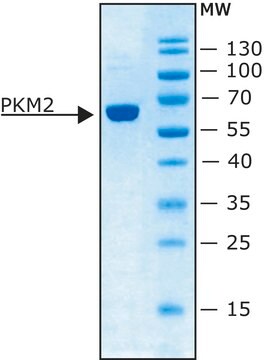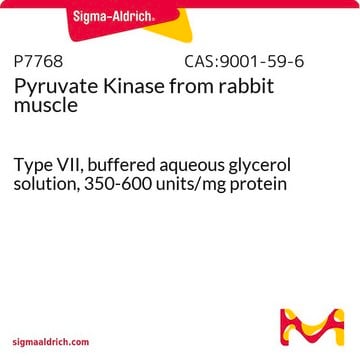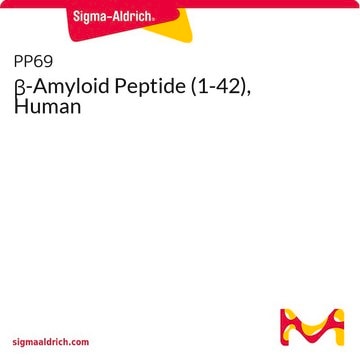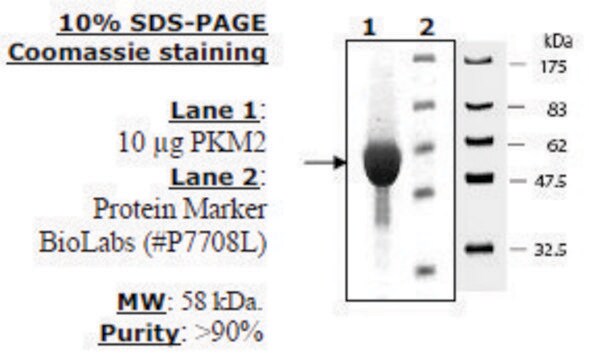SRP0415
PKM1 active human
recombinant, expressed in E. coli, ≥80% (SDS-PAGE)
Synonym(s):
OIP3, PK3, PKM2, TCB, pyruvate kinase, muscle
About This Item
Recommended Products
biological source
human
recombinant
expressed in E. coli
Assay
≥80% (SDS-PAGE)
form
aqueous solution
mol wt
59 kDa
packaging
pkg of 20 μg
manufacturer/tradename
Sigma-Aldrich
storage condition
avoid repeated freeze/thaw cycles
concentration
1.8 mg/mL
technique(s)
cell based assay: suitable
solubility
water: soluble
NCBI accession no.
UniProt accession no.
application(s)
life science and biopharma
shipped in
dry ice
storage temp.
−70°C
Gene Information
human ... PKM(5315)
General description
Pyruvate kinase (PK) has four isozymes such as PKL, PKR, PKM1, and PKM2. PKM1/2 is located in the distal convoluted tubule of the kidney, embryo, lungs, proliferative tissues, retina, adipose tissues, and islets. The PKM1 gene is located on the human chromosome at 15q23.
Application
- cell-based kinase assay to study the ability of a compound to inhibit the kinase activity of PKM1.
- oxidative stress experiments on PKM2.
- Co-immunoprecipitation (Co-IP) to determine pyruvate kinase M2 (PKM2) as a novel direct binding partner of phosphoserine aminotransferase 1 (PSAT1).
Biochem/physiol Actions
Signal Word
Danger
Hazard Statements
Precautionary Statements
Hazard Classifications
Eye Irrit. 2 - Repr. 1B - Skin Irrit. 2
Storage Class Code
6.1C - Combustible acute toxic Cat.3 / toxic compounds or compounds which causing chronic effects
WGK
WGK 1
Flash Point(F)
Not applicable
Flash Point(C)
Not applicable
Certificates of Analysis (COA)
Search for Certificates of Analysis (COA) by entering the products Lot/Batch Number. Lot and Batch Numbers can be found on a product’s label following the words ‘Lot’ or ‘Batch’.
Already Own This Product?
Find documentation for the products that you have recently purchased in the Document Library.
Our team of scientists has experience in all areas of research including Life Science, Material Science, Chemical Synthesis, Chromatography, Analytical and many others.
Contact Technical Service









